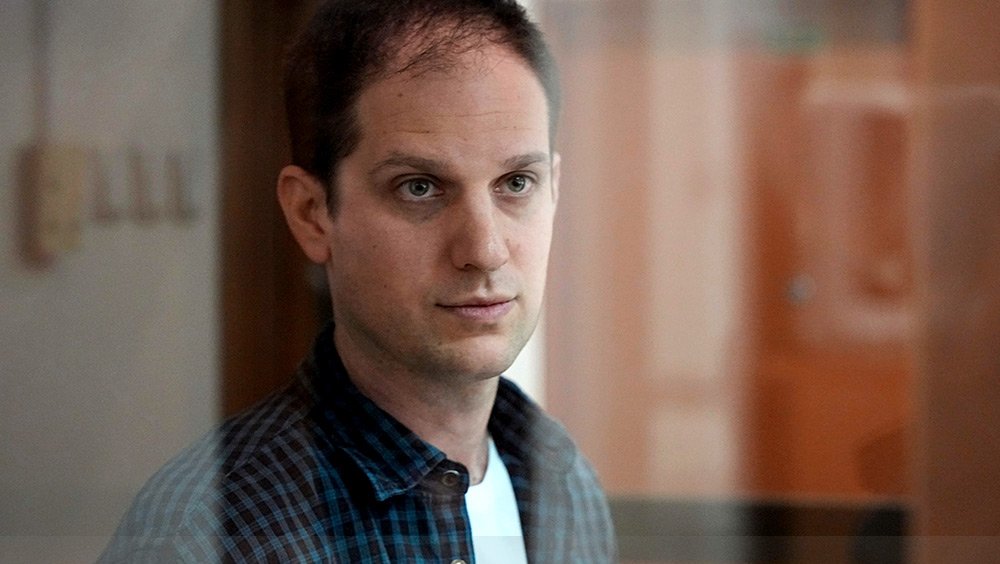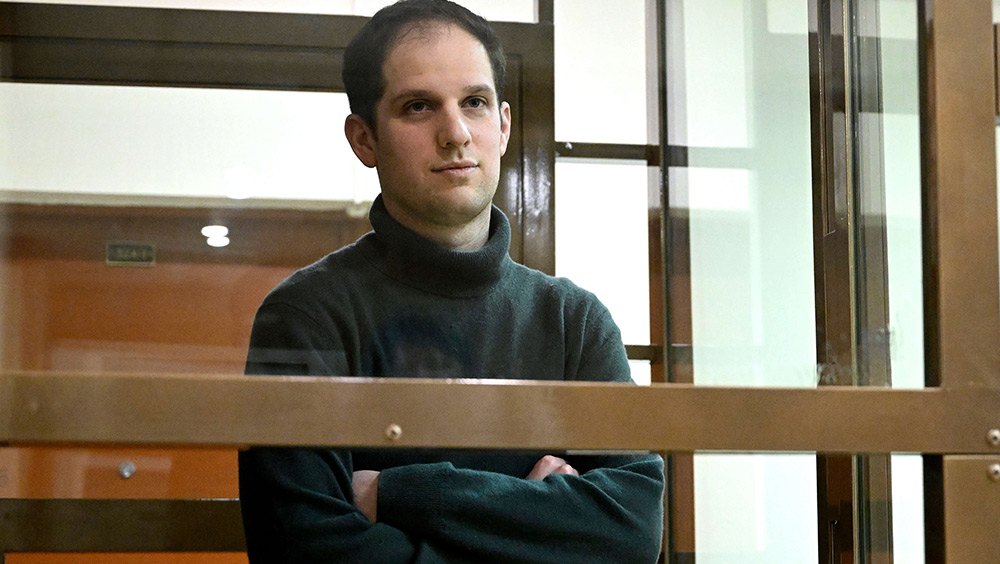U.S. Journalist Evan Gershkovich Marks One Year of Imprisonment in Russia

Most of us do not regularly stop to consider how precious and rare our right to free expression really is.
But for just a few seconds, stop now to hear two names: Evan and Alexey. One, an American journalist. The other, a Russian dissident.
Evan Gershkovich, a Wall Street Journal reporter, remains in prison today. He was arrested in Russia on March 29, 2023, on a charge of espionage that the U.S. says is phony, for reporting on life in Russia.
Alexey Navalny, chief political rival and outspoken critic of Russian President Vladimir Putin, died Feb. 14 in a Russian labor camp near the Arctic Circle. He was arrested in January 2021 when he returned home after hospitalization in Germany after being poisoned in 2020. Navalny’s family blames Putin, implicated in multiple suspicious deaths of political opponents and critics, for Alexey’s poisoning and death.
Both Evan and Alexey were arrested for acts of press and protest that would not be criminal in the United States because the First Amendment protects our free press and free speech rights — protection not just for journalists and activists but for all of us.
We do not have to fear secret police smashing down our front door at 3 a.m. because of some unpopular political view we endorsed during a phone call to a friend. We don’t have to be concerned that something we write in a letter or publish in a news report will be used against us by a government prosecutor.
We don’t have to fear that an article or opinion — or just a “like” — on social media will bring charges of treason. We don’t have to lay awake at night hoping a chat at a restaurant won’t be reported to authorities as proof of criminal conspiracy.
And we can put flowers at the grave of a political figure we admire, unconcerned that in the next moment we will be roughly dragged away by heavily armed police into a waiting transport van, to be whisked off to prison without so much as a simple notice to friends or family.
In Russia and elsewhere around the world, we would have to be concerned, worried or fearful.

Wall Street Journal reporter Evan Gershkovich stands in a glass cage in a courtroom at the Moscow City Court, in Moscow, Russia, on Dec. 14, 2023.
But in the U.S., we are all protected by the First Amendment for what we believe, say and write. The First Amendment’s 45 words also shield us from government control or punishment over the people we associate with and what we might demand from our elected officials.
There was no such protection for Alexey and Evan, and for the thousands of people — hundreds of thousands worldwide — arrested, assaulted or imprisoned just for doing what we can do freely: Believe openly. Speak freely. Report truthfully. Protest proudly. Object loudly.
Evan remains in prison for doing his job. Alexey died for doing what he passionately believed in. As tragic as both circumstances are, we can only wish they were the only two examples of what totalitarian oppression and lack of First Amendment protections can mean.
According to the Committee to Protect Journalists, approximately 320 journalists are imprisoned around the world for doing their jobs, many being beaten or tortured regularly. Thousands more work each day to report news and information under threats from government tyrants. In all too many nations, just posting a question using the wrong word can mean criminal prosecution.
Globally, 320 journalists were imprisoned as of 12/1/23, the second highest recorded since CPJ started collecting data in 1992.
— Committee to Protect Journalists (@pressfreedom) March 15, 2024
The previous record was set in 2022.
Top jailers of journalists: China, Myanmar, Belarus, Russia, Vietnam, Israel, and Iran.https://t.co/GTeGIRhA6K pic.twitter.com/Cb10MRlttK
In Russia, there is no “war” in Ukraine. That nation’s internet censor board, Roskomnadzor, will only permit “special military operation.”
In contrast, “The United States must always stand for freedom of the press around the world, especially in places like Russia, where it is under assault,” said Speaker of the House Mike Johnson on March 4.
Almar Latour, chief executive of Dow Jones and publisher of The Wall Street Journal, has praised U.S. politicians of each party, and those in other nations who “have recognized what we have stated unequivocally since day one: Evan is a journalist, and journalism is not a crime.”
Meeting Feb. 22 with Alexey’s widow and daughter, President Joe Biden “expressed his admiration for Alexey Navalny’s extraordinary courage and his legacy of fighting against corruption and for a free and democratic Russia in which the rule of law applies equally to everyone,” the White House said.
We’re free to criticize even the First Amendment itself without fear, as it protects our right to be a critic. We’re free to hold any religious view or ethical position we wish; free to praise or oppose government personalities or policies.
Under the First Amendment, discussion and dissent are not proof of disloyalty. Engagement with those who hold unpopular positions is not treasonous endorsement. Opposition does not bring imprisonment.
And reporting truthfully on uncomfortable facts or views, or expressing political opposition does not mean jail, torture or death.
For all of us, the First Amendment is the bulwark of democracy and freedom, standing between us and oppression. We must stop and consider that for Evan, not having that protection, that bulwark, meant imprisonment. And for Alexey, it meant death.
Vladimir Putin may someday be called to account for Alexey’s demise. But he can let Evan come home. Now.
Gene Policinski is a senior fellow for the First Amendment at the Freedom Forum. He can be reached at gpolicinski@freedomforum.org

